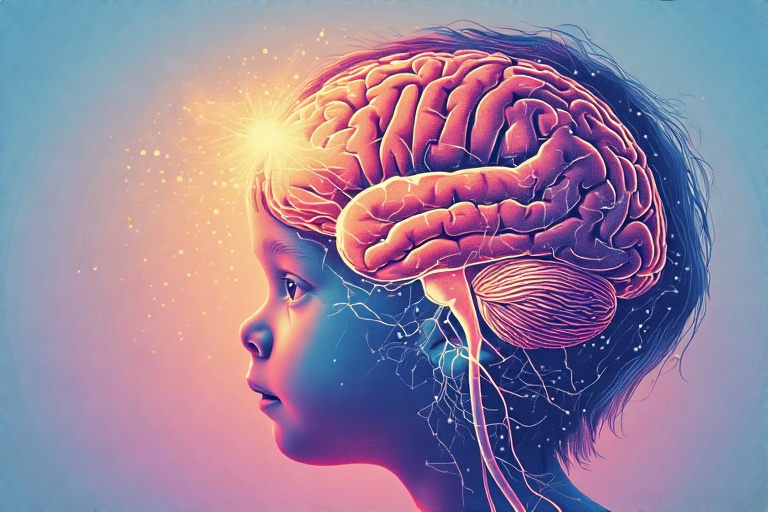ADHD, or Attention Deficit Hyperactivity Disorder, is one of the most commonly diagnosed neurodevelopmental disorders in children and adolescents. It is primarily characterized by difficulties with concentration, excessive impulsivity, and problems with emotional regulation, all of which significantly affect a child’s daily functioning both at home and at school. For many years, it was believed that the main cause of ADHD was genetic factors. However, an increasing number of scientific studies now indicate that the environment in which a child grows up plays an equally important role. Particularly concerning is the impact of chronic stress, especially when experienced in early childhood, on brain development and the risk of developing ADHD. The modern world, full of haste, pressure, and an overload of stimuli, means that more and more children experience stress on a daily basis, which can have long-term consequences for their mental health and cognitive development.
Childhood Stress – The Silent Enemy of Development
Stress is a natural response of the body to difficult situations, but when it becomes chronic, it can seriously disrupt a child’s proper development. Today’s children are exposed to many sources of stress – from family tensions and school pressure to peer conflicts and an excess of digital stimuli. It’s important to remember that children do not yet have fully developed mechanisms for coping with difficult emotions, so even seemingly trivial situations can be a significant source of stress for them. Chronic stress in childhood not only affects mood and behavior but also the development of brain structures responsible for learning, memory, impulse control, and emotional regulation. Children who regularly experience stressful situations may have trouble concentrating, show increased irritability, and be more susceptible to developing disorders such as ADHD, depression, or anxiety. Therefore, it is crucial to pay attention to the signals sent by the child and try to minimize stress factors in their environment.
How Does Stress Affect a Child’s Brain Function?
A child’s brain is extremely plastic, meaning it reacts intensely to environmental stimuli and learns quickly – both positive and negative patterns. In the first years of life, the brain develops at a rapid pace, forming millions of new neural connections every day. It is during this time that basic cognitive, emotional, and social skills are shaped. Unfortunately, chronic stress can disrupt this process, leading to lasting changes in the structure and functioning of the brain. Children who experience long-term stress often have trouble concentrating, are more impulsive, and have problems with emotional regulation. Research shows that stress can lead to excessive activation of the limbic system, responsible for emotional responses, and weakening of the prefrontal cortex, which is responsible for planning, predicting consequences, and impulse control. In practice, this means that a child may have difficulty learning, solving problems, and establishing and maintaining relationships with peers. Moreover, chronic stress can lead to sleep disorders, reduced immunity, and increased susceptibility to psychosomatic illnesses.
Changes in Prefrontal Cortex Function – The Center of Control and Planning
The prefrontal cortex is one of the most important areas of the brain, responsible for so-called executive functions, such as planning, decision-making, predicting consequences, controlling impulses, and regulating emotions. It is thanks to the prefrontal cortex that we can focus on a task, delay gratification, or refrain from undesirable behaviors. In children exposed to chronic stress in the early years of life, the developmental processes of this part of the brain are disrupted. Neuropsychological studies show that chronic stress leads to changes in the structure of neurons and weakening of the connections between them, resulting in a reduced ability to regulate emotions and behavior. In practice, this means that the child becomes more impulsive, has trouble concentrating, gets discouraged more easily, and is more likely to make risky decisions. Many children with ADHD show deficits in prefrontal cortex function, which may partly result from their early stressful experiences. It is worth noting that the prefrontal cortex develops until early adulthood, so supporting and protecting a child from chronic stress is crucial for their proper development.

Neurotransmitter Disorders and the Risk of ADHD
Neurotransmitters are chemical substances that enable communication between nerve cells in the brain. The most important ones in the context of ADHD are dopamine and noradrenaline. Dopamine is responsible for motivation, motor control, the experience of pleasure, and mood regulation, while noradrenaline affects the level of arousal, the ability to concentrate, and the response to stress. Under stress, the so-called HPA axis (hypothalamic-pituitary-adrenal axis) is activated, leading to an increase in cortisol – the stress hormone. Chronically elevated cortisol levels can disrupt the production of dopamine and noradrenaline, negatively affecting cognitive abilities, impulse control, and the child’s overall well-being. Deficiencies in these neurotransmitters are one of the mechanisms leading to the development of ADHD, as well as other emotional disorders such as depression or anxiety. Children with disrupted neurotransmitter production may have trouble with motivation to learn, become discouraged more quickly, and be more irritable and impulsive. It is important to note that neurotransmitter disorders can be both a cause and a consequence of chronic stress, creating a vicious cycle of emotional and cognitive difficulties.
Depression and Long-Term Effects of Stress – Not Just ADHD
Improper regulation of neurotransmitters is not only a greater risk of ADHD. Children who experience chronic stress during development are more susceptible to depression, anxiety, and adaptation difficulties in adulthood. High cortisol levels can negatively affect the hippocampus – the area of the brain responsible for memory and emotional regulation. Chronic stress leads to excessive stimulation of the nervous system, which over time can result in reduced stress resilience and difficulties coping with life’s challenges. Children who live in stressful environments for extended periods may have trouble forming relationships, show symptoms of social withdrawal, and be more prone to addictions later in life. Studies show that chronic stress in childhood increases the risk of depression several times over, and its effects can be felt throughout life. Therefore, it is important to ensure that the child has opportunities to relieve stress, develop coping skills for difficult emotions, and build positive relationships with peers and adults.

Conclusions and Prevention – How to Protect a Child from the Negative Effects of Stress?
Knowledge about the impact of stress on child development allows for the implementation of effective preventive measures that can significantly reduce the risk of ADHD and other emotional problems. First and foremost, it is important to create a supportive family environment where the child feels safe, loved, and accepted. Regular conversations, showing interest and support, and spending time together are the foundations of healthy emotional development. It is also important for parents and caregivers to be aware of their own emotions and know how to cope with stress, as children often adopt behavioral patterns from adults. Attention should also be paid to stress management techniques for the youngest, such as limiting digital stimuli, contact with nature, providing the child with space for free play, and teaching simple relaxation techniques, such as breathing exercises or yoga. Supporting the development of social skills, teaching the recognition and naming of emotions, and building self-esteem are other elements of prevention that can help a child better cope with difficult situations. If you notice worrying symptoms such as chronic low mood, concentration difficulties, or social withdrawal, it is worth consulting a specialist – a child psychologist or psychiatrist who can help diagnose the problem and offer appropriate support.
Practical Tips for Parents and Caregivers
To effectively protect a child from the negative effects of stress, it is worth introducing a few simple but effective habits into everyday life.
First, ensure a regular daily routine – fixed times for meals, sleep, and play help the child feel safe and secure.
Limit screen time – excessive use of electronic devices can increase stress and make it harder to concentrate.
Encourage physical activity and contact with nature – walks, outdoor play, or contact with animals have proven anti-stress effects.
Teach the child relaxation techniques – simple breathing exercises, yoga, or meditation can help regulate emotions and lower stress levels.
Take care of your own stress levels – children often pick up on the emotions of adults, so it is also important to look after your own well-being and ability to cope with difficult situations.

Remember that the most important thing is to build a positive, supportive relationship with your child, based on trust, acceptance, and mutual respect.
Summary
Chronic stress in childhood is a serious risk factor for the development of ADHD and other emotional and cognitive disorders. A supportive family environment, appropriate parenting methods, and educating parents about the mechanisms of stress can significantly reduce the negative effects of stress on the youngest. Remember, investing in a child’s mental health is an investment in their future – the earlier we start caring for our children’s emotional well-being, the greater the chances for their happy and healthy adult life. If you notice worrying symptoms in your child, do not hesitate to seek help – the support of a specialist may be crucial for your child’s proper development and functioning. Also, remember that each of us can influence how a child copes with stress – let’s be their support, teach them to recognize and name emotions, show them how to deal with difficulties, and build together a world where stress is not an obstacle, but a challenge that can be overcome.


